On Republic Day eve last week, Subedar Neeraj Chopra -- who ended India's 125 year wait for an athletic medal at an Olympics by winning the javelin event at the Tokyo Games -- received a dual honour from a grateful nation.
The Olympic gold medalist was awarded both the Padma Shri and the Param Vishist Seva Medal, which is usually awarded to lieutenant generals in the Indian Army.
Arjun Singh Kadian relives the moment that Neeraj Chopra made history.
A fascinating excerpt from Neeraj Chopra: From Panipat To The Podium.
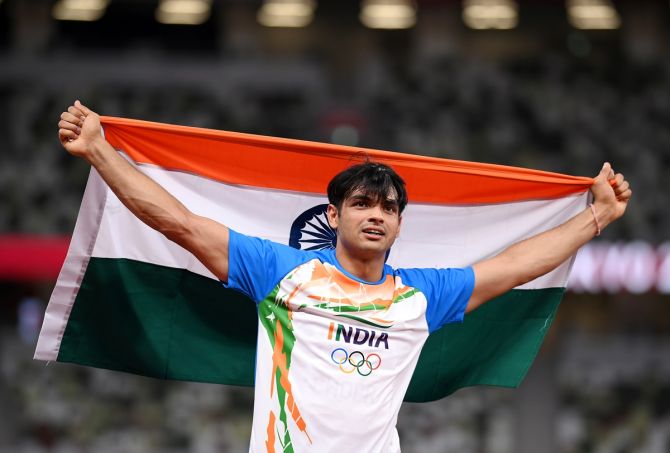
The Olympics became a big buzz in India as well as the world.
The wrestlers, boxers, archers and shooters were a disappointment.
There were some flickers of hope but let's concentrate on Neeraj Chopra's game.
Owing to the global pandemic, which was still prevalent, the Indian contingent reached Tokyo in batches.
According to the Games protocol, athletes could enter Tokyo only five days before their event and leave no later than 48 hours after their competition ended.
There were also quarantine rules and regulations for different players that proved a tremendous logistical challenge for the IOA.
Neeraj was in Upsala, Sweden, before the Games and went to Tokyo from there.
7 August 2021
'Yeh kya ho gaya, Bhai?'
(What has happened, Brother?)
-- Neeraj Chopra
On the evening of 7 August, the best from the qualifying rounds had gathered in the national stadium.
Former Olympic gold medallist Thomas Roehler had opted out of the Games.
The other two medallists, Yago and Walcott were out in the qualifiers.
Vetter delivered a disappointing performance in the qualifiers, losing out on his winning streak of 18.
The national stadium was lit. Neeraj was in form. He had often said that his best performances were in the biggest of events.
The more limelight, competition and challenges he faced, the better were his efforts and, ultimately, performance.
The temperature was 28 degrees, humidity 81 per cent and the wind was blowing east at a speed of 2 km/hr.
The stage was set. There was a slight breeze, and there were prospects of rain.
The commentators were right in noticing the weather. If it rained, it could wreak havoc on the performance of the athletes.
The javelin boots have high spikes to control the body from that blocking leg, after the athlete makes his fulleffort throw.
There were two 23 year olds, including Neeraj, and a 38 year old.
But time and again, the commentators reminded the audience watching the Games worldwide that the best prospect and champion was Johannes Vetter.
Nobody else in the finals had thrown over 90 m.
The list was as follows:
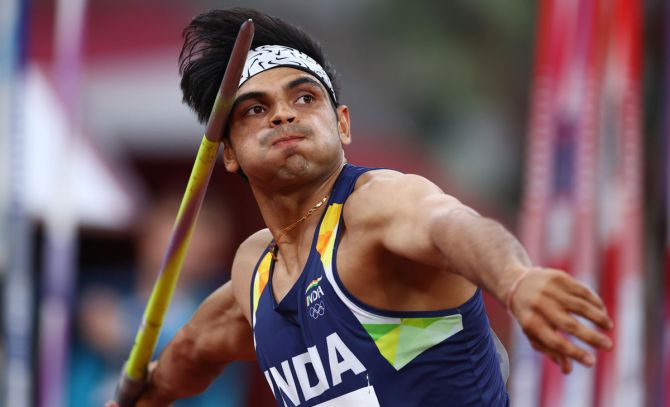
The beautiful pink Panasonic boards welcomed each player in the same sequence.
Neeraj entered the competition with a haircut because now nothing could come between him and his best throw.
Neeraj jogged in front of the cameras with a bandana holding his hair, joined hands to bow, and did a namaste.
If one sees the season's best performances, Neeraj was only second to Vetter.
He entered the ground looking very calm and composed.
Remarking on Vetter, the commentators said, 'Here is the great man. JoJo (his nickname), Johannes Vetter. Looking very relaxed and composed. He is an enormous individual, isn't he? Sporting a beard with his hair slicked back.'
He was followed by Pakistani Arshad Nadeem who waved and tapped his chest with the flag of his country on his T-shirt.
The Moldavian threw the first one above the 80-m mark. Neeraj followed, wearing a dark blue vest with 'India' marked on the back.
The cameras showed him walking up to Arshad Nadeem, taking the fluorescent coloured javelin from him.
He rubbed the grip and swiftly walked towards the starting mark.
Neeraj looked muscled, a little anxious, but in control.
With the javelin in his right hand, Neeraj ran towards the running track, his start mark.
He relaxed his left arm, stopped and dropped his javelin. He then adjusted his lower back brace and picked up the javelin again.
He extended his left leg and twisted and stretched his right foot.
With the javelin tip wrapped in the left hand and the right hand on the grip, he pulled his arm and shoulder, all the way back. He looked extremely focused.
With the javelin above his shoulder, he ran high and fast towards the throwing arc with good, strong strides. It was a nice crossover.
His arm pulled back, and in a split second the javelin was flying through the skies. Just the way his career had been!
The roar was loud. The throw was confident. Neeraj put all of his power into it and landed on his arms. The landing distance: 87.03 m.
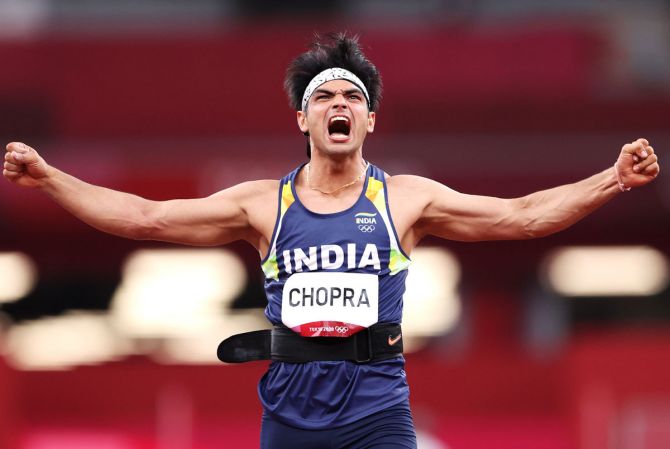
Other competitors followed. Another important thing was that there was very little gap in the season's best performances of the athletes other than of course, Vetter.
Hence, it came down to who would be giving the best performance on the day.
With his throw and the dominating performance in the qualifying round, Neeraj was automatically the next favourite after Vetter.
With bib number 2183, wearing a yellow-and-blackstriped vest, Vetter hopped onto his feet at the starting mark.
He ran strong and confident, but his first throw was not impressive -- 82.52 m.
Following Vetter's mark, the cameras moved swiftly to Neeraj, who obliged them with a cheerful smile.
It seemed as if he knew it. He was relaxed, sipping some water. His job was more or less done. He had set a solid benchmark.
The competition was happening in two rounds. The top eight throwers in the first three attempts would be allowed the remaining three.
That essentially meant that if you were good enough, you would qualify for the final of finals.
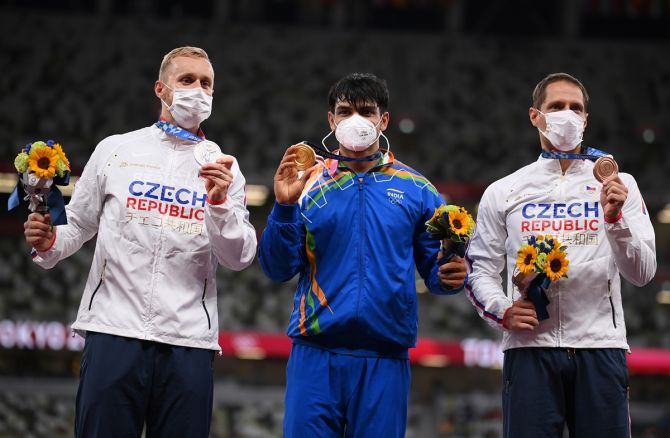
After his first round, Neeraj started for his second one after the Moldavian improved slightly on his opening attempt.
Neeraj walked towards the starting point. He gestured for claps overhead to raise a response from the watching crowd.
Confident, he held the javelin in his right hand as the select Indian crowd in the audience was ready to witness the best performance of the day.
Neeraj was not looking for a medal now. He was aiming for gold. He led in the first round and Vetter was down, languishing five metres behind.
Neeraj ran in fast, did the crossover. The javelin flew out of his hands and he did not look towards the sector. He just knew he had bettered the first attempt.
The moment the javelin left his hand, he knew he had done it.
Neeraj turned back to the stands, raising his arms. He punched the sky twice and smiled.
The throw measured 87.58 m! Even Klaus could not hide his feelings. Others followed with their throws.
Another sight that captured the eye was that of Neeraj, in utmost sportsmanship, clapping as Vetter readied himself to make the throw.
Vetter ran hard and fast but right before he made the throw, his left foot slipped.
The javelin left Vetter's arm, flew a little distance even as he tumbled, rolling outside the throwing arc. It was a no-throw.
Vetter's frustration was evident. He walked back, still looking at the run-up track.
His left foot had slipped, destroying his block. The power failed to transfer, damaging his prospects.
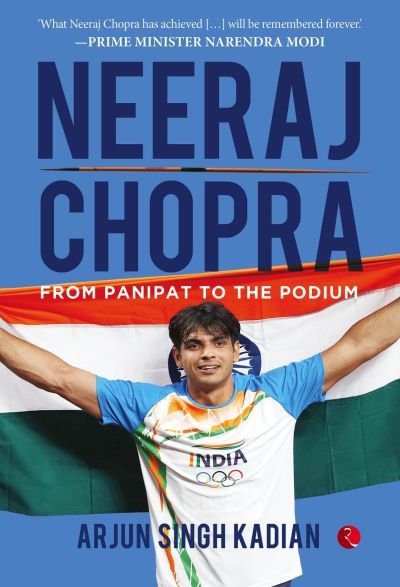
Neeraj's third was not good enough. Vetter's third was also disqualified.
Nodding, he stepped out of the throwing arc. He looked at the synthetic turf, utterly disappointed.
At the end of three attempts, Vetter was sitting at the disqualification margin.
Four throwers had to make an attempt, and anyone could push him down and out.
With the last throw from Belarus, Vetter stood ninth in the table.
And the commentators were loud and clear, 'He is done. He is finished in Tokyo 2020.'
Vetter had delivered a disappointing performance.
He was fourth in Rio and that was his motivation.
How much did it mean to him? He had the Olympics rings tattooed on his back.
At the end of the three designated throws, Neeraj led the standings with 87.58 m, followed by Czech Vitezslav Vesely (85.44 m) and German Julian Weber (85.30 m).
Arshad Nadeem, who called Neeraj Chopra his hero, was in fourth place.
At the end of the round, officials paused the game for some time as the 1500 m finals was about to start.
The performing sequence also changed. The worst performer of the first three rounds went in first and the best performer went in last.
Regardless, nobody came close to Neeraj's second throw of 87.58 m.
It was his best performance on the day and it won him the gold medal.
The Czech Republic's Jakub Vadlejch came second with his best effort of 86.67 m and another Czech Vitezslav Vesely took the bronze with 85.44 m.
The boy from Khandra became a young man in Tokyo. Twenty-three-year-old Neeraj Chopra won India its first gold medal in athletics.
Excerpted from Neeraj Chopra: From Panipat To The Podium by Arjun Singh Kadian, with the kind permission of the publishers, Rupa Publications India.
Feature Presentation: Aslam Hunani/Rediff.com
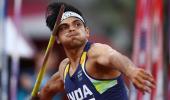


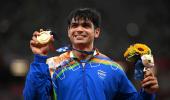








 © 2025
© 2025